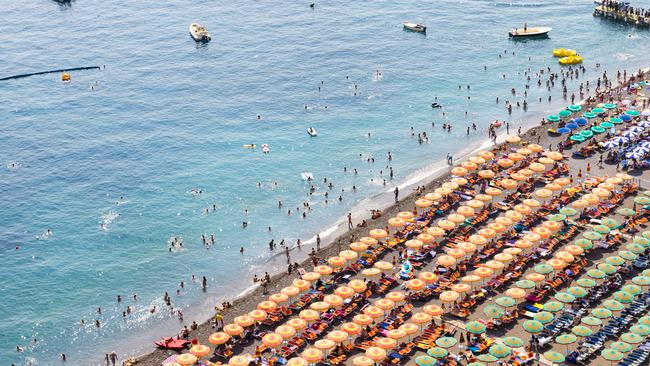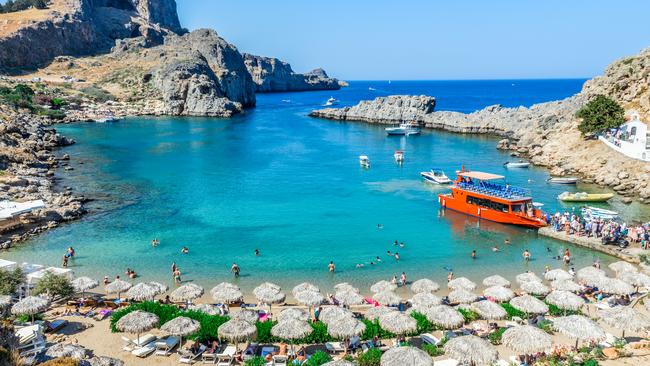European summer travel: lack of supply forcing travellers to book outside of peak season
With flight costs soaring and the possibility of more record-breaking heatwaves, spring could soon be Europe’s new summer.

Save for the small window when its southern states hit single digit temperatures, Australia runs hot.
It’s probably why the threat of another European heatwave hasn’t stopped Australians from booking winter escapes to Mykonos and Positano at the peak of the northern summer as if our lives – and social media feeds – depend upon it.
Travel experts say those who haven’t yet booked their 2023 Euro holiday but are still hoping to get a reasonable deal for peak season travel have missed not only the boat, but the flights, rental cars and Michelin-starred dinner reservations.
With lack of supply keeping the cost of flying at a premium, savvy travellers began booking flights for peak season up to two weeks earlier than usual according to data from Webjet.
“People are definitely getting early,” said David Galt, CEO of Webjet OTA. “We saw some good deals in the Black Friday sales in mid to late November last year, so our average lead time for bookings to Europe is about 134 days long.
“For accommodation - certainly, the good accommodation - people needed to get onto booking that as well.”
Mr. Galt said one of the biggest issues facing Australians wanting to travel to Europe during the height of its summer was a lack of supply.
“In terms of flights, there’s less airline capacity from Australia servicing the northern hemisphere, especially Europe, so we are definitely seeing the more affordable seats sell out with a longer lead time than pre-pandemic,” he explained.
“They’re a bit harder to find because supply is outstripping demand at this point.”
The European shoulder season, which typically runs from late March to mid-June, has traditionally been an option for those wanting to both avoid the annual hordes of tourists as well as paying a financial premium.
This year, flights between Australian and European cities are between 10 and 30 per cent more expensive in August than in May, according to data from Webjet. A return economy flight from Melbourne to Amsterdam, for example, could be found for about $1440 for travel in May, compared to $2000 for August.

But with the returning threat of post-pandemic over-tourism and warnings from climate experts that the continent was becoming a “geographical hot-spot”, the line between the two travel seasons is beginning to blur as more holidaymakers opt to avoid both the extreme heat and intense crowds.
Flight Centre Travel Group’s Danielle Galloway said shoulder season travel had become more attractive for their clients who desired a luxury summer holiday but were flexible with dates.
“The pressure on flight capacity and the high cost of business class and first-class travel (our clients‘ preferred travel classes) has also resulted in a shift of timing, and shoulder seasons are more popular,” she explained.
Ms. Galloway, the company’s global managing director of luxury and Independent brands, said airline capacity was a major reason for this shift “but certainly not the only reason“, as luxury travel clients were seeking more culturally enriching experiences at a slower pace.
“Travelling in high season has therefore become less critical as the needs of luxury travellers are changing from ‘high season holiday’ to ’enriching experiences and a slower pace of travel’ - time to enjoy a holiday is appreciated like never before,” she said.
The trend is also happening at sea.
Demand for luxury cruising is swiftly recovering since the pandemic, with operators now fielding bookings for the 2025 European summer period.
Oceania Cruises’ Jason Worth said passengers were happy to book during shoulder season if it meant they could secure a stateroom or suite, such was the current appetite for luxury European voyages. “Plus, there’s the added benefit of better availability of air from our region, coupled with more moderate temperatures,” he added.
The Vista, the luxury cruise operator’s newest liner, will set sail from Rome in May 2023, and is already booked all the way through to 2025.
While there are fewer deals to be had for those still pining for a Greek Island summer escape this year, belated bookings aren’t completely out of the question. An anticipated rise in international carriers - particularly from China - returning to Australia is expected to add capacity from March and April, which according to Mr. Galt could “alleviate pressure on prices”.
“I’d be acting quickly,” he said, adding that with the season fast approaching, flexibility was also important. “Sometimes moving a few days aside from your ideal travel dates can really open up some great pricing.”


To join the conversation, please log in. Don't have an account? Register
Join the conversation, you are commenting as Logout